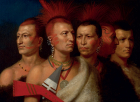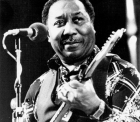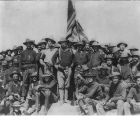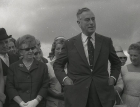World
The modern world cannot be studied without examining the course, impact and legacy of two world wars, the resources in this section set out to look at both the First and Second World Wars in their global context. The section also includes the Cold War and its impact in Latin America, South-East Asia and parts of Africa. This period also sees the rise and fall of European imperialism and the changing nature of global politics and economics as technology brings different stories from so many parts of the world directly to us. Read more
Sort by:
Date (Newest first) | Title A-Z
Show:
All |
Articles |
Podcasts |
Multipage Articles
-

Introductory film: Brezhnev - Interpretations
ArticleClick to view -

Introductory film: Lenin - Interpretations
ArticleClick to view -

Introductory film: Khrushchev - Interpretations
ArticleClick to view -

The Olympics - politics, impact and legacy - its not just about the sport
ArticleClick to view -

Ending Camelot: the assassination of John F Kennedy
ArticleClick to view -

Anti-Americanism in Britain during the Second World War
ArticleClick to view -

Doomed to fail: America’s intervention in Vietnam
ArticleClick to view -

Facing the Revolution: the other Americans
ArticleClick to view -

Muddy Waters: from migrant to music icon
ArticleClick to view -

History Abridged: American Policy: theory and practice over 200 years
ArticleClick to view -

My Favourite History Place: The Tenement Museum, New York
ArticleClick to view -

The Spanish-American War revisited: rise of an American empire?
ArticleClick to view -

Evelyn Waugh’s books on the Italo-Ethiopian War, 1935–36
ArticleClick to view -

The Mary Celeste: the history of a mystery
ArticleClick to view -

The rise and fall of Nauru
ArticleClick to view -

Mountbatten in retirement: the abortive trip to rebel Rhodesia
ArticleClick to view -

Real Lives: Anna Wessels Williams (1863–1954)
ArticleClick to view -

Recorded Webinar: India and the Second World War
ArticleClick to view -

Recorded Webinar: ‘Drawing the Line’: the 1947 Partition of India
ArticleClick to view -

Recorded Webinar: Resisting Reagan
ArticleClick to view

